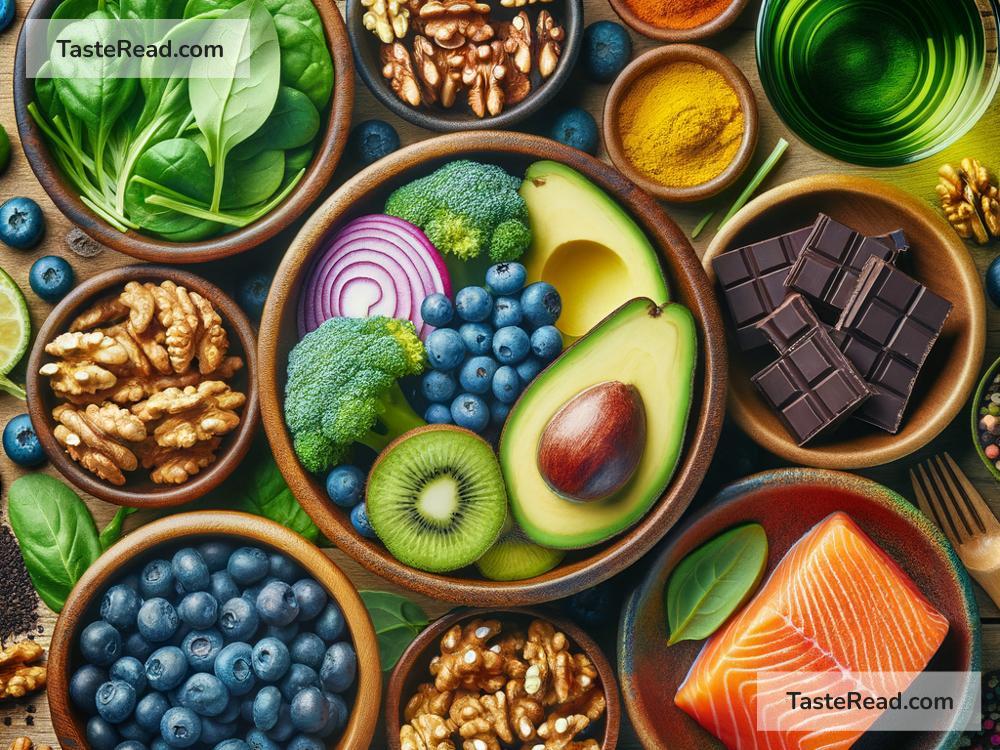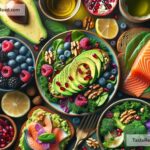Foods for Boosting Brain Connectivity
Your brain is an amazing organ that controls everything you do, from thinking and remembering to moving and feeling. Just like the rest of your body, the brain needs good nourishment to work its best. Eating the right foods can help improve neural connectivity, which is how brain cells communicate with each other.
Good neural connectivity is essential for sharp thinking, problem-solving, learning, and memory. It’s also important for emotional balance and reducing risks of brain-related conditions like Alzheimer’s or depression. The good news is that adding certain foods to your diet can give your brain a healthy boost. Let’s dive into some brain-friendly options!
1. Fatty Fish
Fish like salmon, mackerel, sardines, and trout are rich in omega-3 fatty acids. These healthy fats play a key role in building and repairing brain cells. Omega-3s also help brain cells communicate with each other better, making them critical for neural connectivity. Studies show that people who eat plenty of omega-3s have better memory and learning abilities.
Don’t eat fish often? You can try plant-based options for omega-3s, like chia seeds, flaxseeds, walnuts, or algae-based supplements.
2. Berries
Berries such as blueberries, strawberries, and blackberries are packed with antioxidants. Antioxidants help protect brain cells from damage caused by free radicals, which can lead to aging and poor brain function. Berries also contain compounds that help improve communication between brain cells.
Adding berries to your diet can boost memory, reduce inflammation, and improve overall brain health. Enjoy them in smoothies, cereals, or just as a snack!
3. Nuts and Seeds
Nuts and seeds, like almonds, walnuts, sunflower seeds, and pumpkin seeds, are all brain-friendly treats. They provide vitamin E, an antioxidant that protects your brain and keeps it healthy as you age. Walnuts, specifically, are loaded with omega-3s, making them a superfood for improving neural connectivity.
A handful of nuts or seeds each day can make a big difference. Sprinkle them on salads, yogurt, or oatmeal for added crunch and brain power.
4. Whole Grains
Whole grains, like oats, brown rice, quinoa, and whole wheat bread, provide a steady source of energy for your brain. Your brain needs glucose (sugar) to function well, and whole grains release this energy slowly, keeping you sharp and focused throughout the day.
Opting for whole grains instead of processed carbs can help stabilize blood sugar levels, which is great for concentration and mental clarity.
5. Leafy Greens
Veggies like spinach, kale, broccoli, and Swiss chard are loaded with nutrients that support brain health. They contain vitamin K, lutein, folate, and beta-carotene, which have been linked to better memory and cognitive function.
Leafy greens also help reduce inflammation in the brain, supporting smoother communication between neural pathways. A daily serving of greens in your salad, smoothie, or stir-fry can do wonders for your brain.
6. Eggs
Eggs are a fantastic source of choline, a nutrient that is crucial for producing acetylcholine, a neurotransmitter that helps brain cells communicate. Choline also plays a role in improving memory and boosting overall brain performance.
Eggs also provide brain-supporting nutrients like B vitamins, which protect brain cells from degeneration. Scrambled, poached, boiled—no matter how you enjoy them, eggs are an excellent addition to your diet.
7. Dark Chocolate
Good news for chocolate lovers! Dark chocolate (with at least 70% cocoa) is rich in flavonoids, caffeine, and antioxidants that help improve brain function and connectivity. Flavonoids help increase blood flow to the brain, promoting better communication between brain cells.
A small piece of dark chocolate can boost your mood, memory, and focus. Just don’t overdo it—stick to one or two small squares a day to keep your brain happy.
8. Avocados
Avocados are packed with healthy fats that support brain cell membranes, helping them stay flexible and efficient. Avocados also contain potassium, which aids in maintaining healthy blood flow to the brain.
Whether spread on toast or added to a salad, avocados are a creamy, delicious way to feed your brain.
9. Turmeric
Turmeric is a bright yellow spice known for its powerful brain-boosting benefits. It contains curcumin, which can cross the blood-brain barrier and directly benefit brain cells. Curcumin has been shown to promote neurogenesis—the creation of new neurons—and enhance memory and mood.
Add turmeric to your soups, teas, or rice dishes for a flavorful brain boost.
10. Green Tea
Green tea is rich in antioxidants and caffeine, both of which support brain health. It also contains L-theanine, an amino acid that improves the activity of neurotransmitters and reduces stress. This combination enhances attention, memory, and overall neural connectivity.
Swap your soda or coffee for a soothing cup of green tea to nourish your brain and calm your nerves.
Conclusion: Fuel Your Brain with Food
Your brain is like a supercomputer that needs proper fuel to stay efficient. By eating foods rich in healthy fats, antioxidants, vitamins, and minerals, you can improve neural connectivity and protect your brain in the long run. Incorporate fatty fish, berries, nuts, leafy greens, and other brain-friendly foods into your daily meals to give your brain the care it deserves.
Your diet plays a big role in shaping your mental health and cognitive functions, so start making small changes today. After all, a well-fed brain is a happy brain!


